高中英语人教版必修1 Unit 4 Earthquakes单元课件(88张ppt)
文档属性
| 名称 | 高中英语人教版必修1 Unit 4 Earthquakes单元课件(88张ppt) |
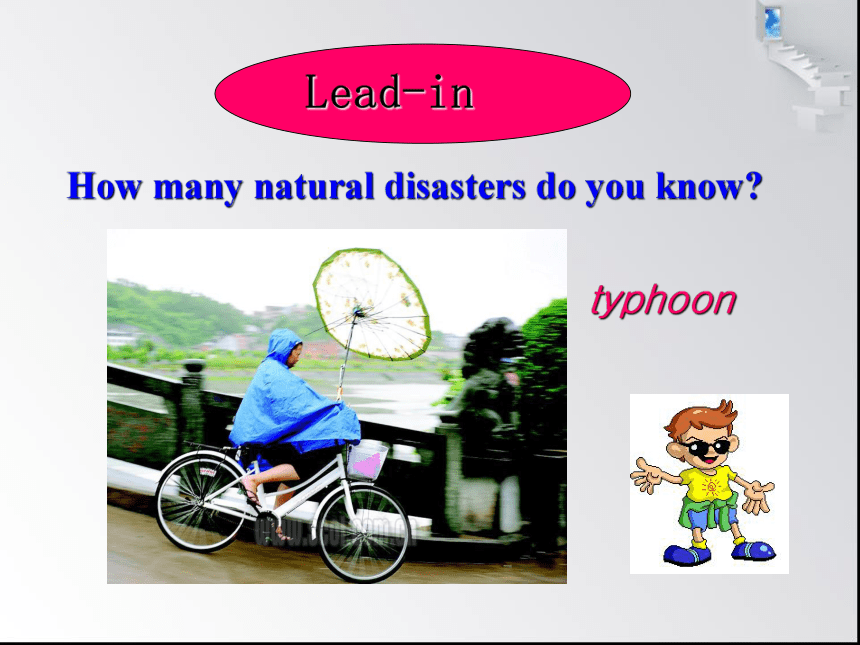
|
|
| 格式 | zip | ||
| 文件大小 | 3.3MB | ||
| 资源类型 | 教案 | ||
| 版本资源 | 人教版(新课程标准) | ||
| 科目 | 英语 | ||
| 更新时间 | 2020-01-30 00:00:00 | ||
图片预览

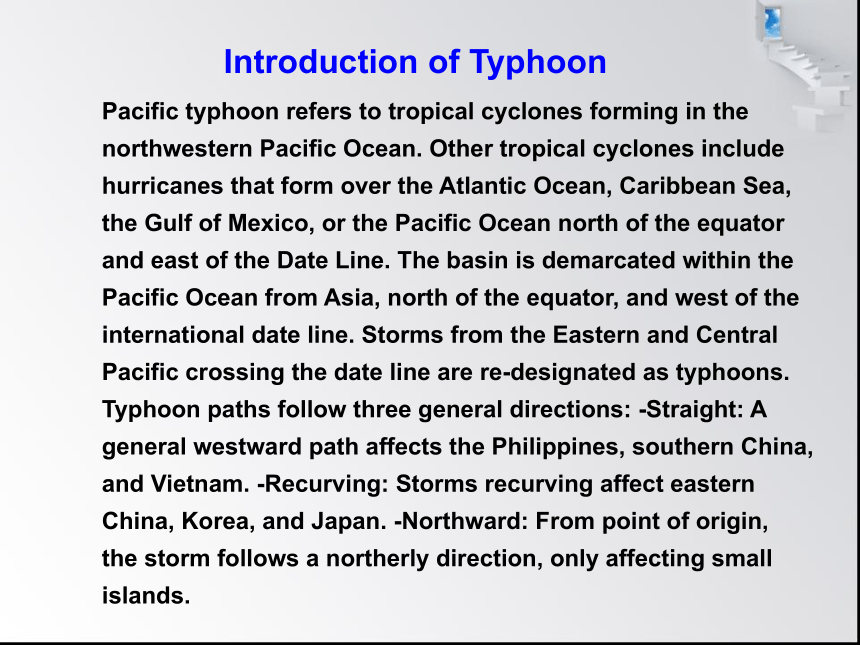
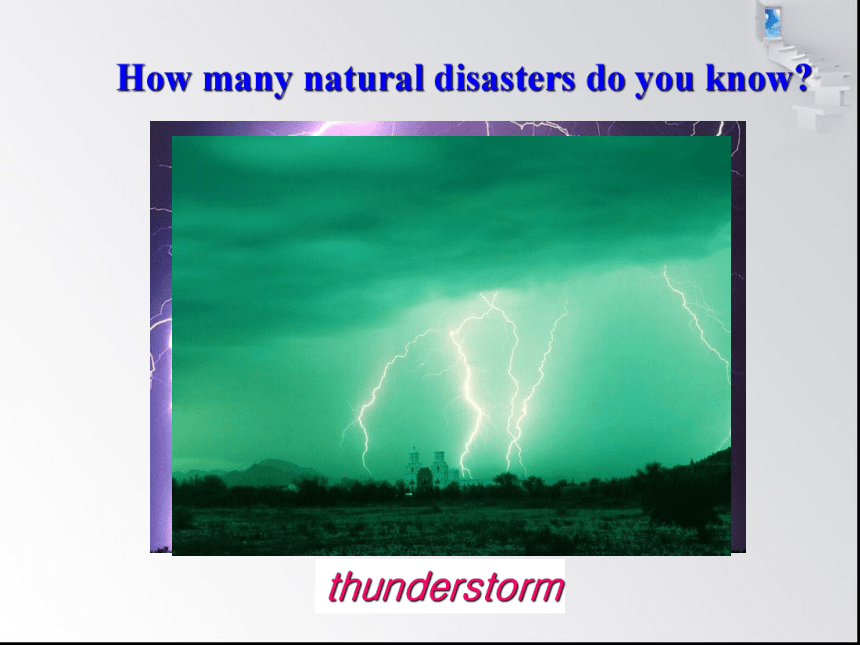

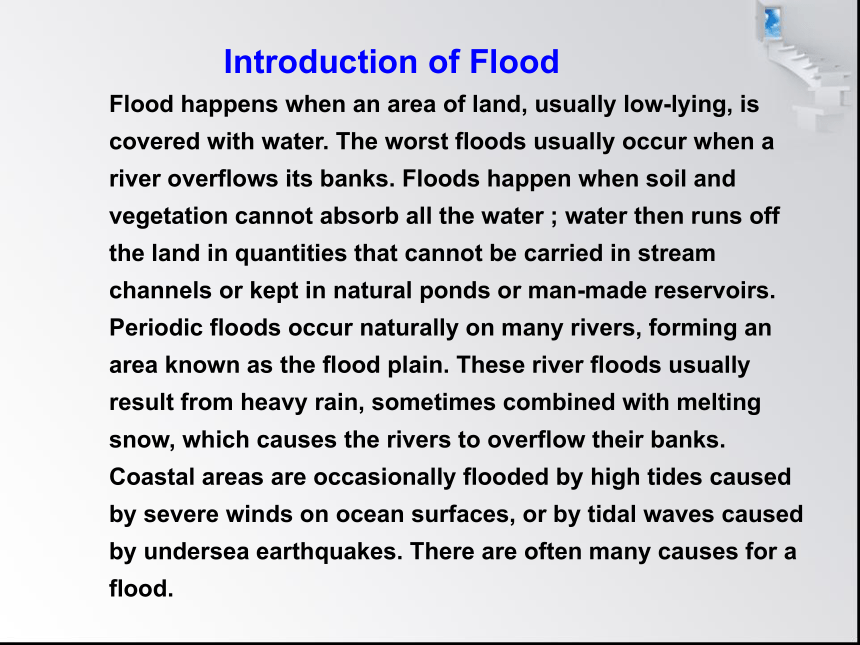

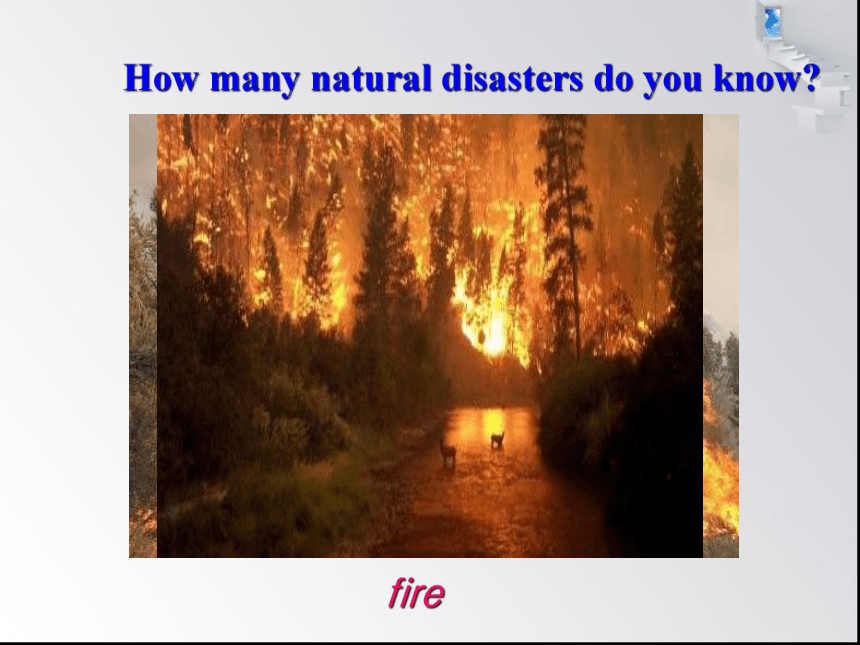
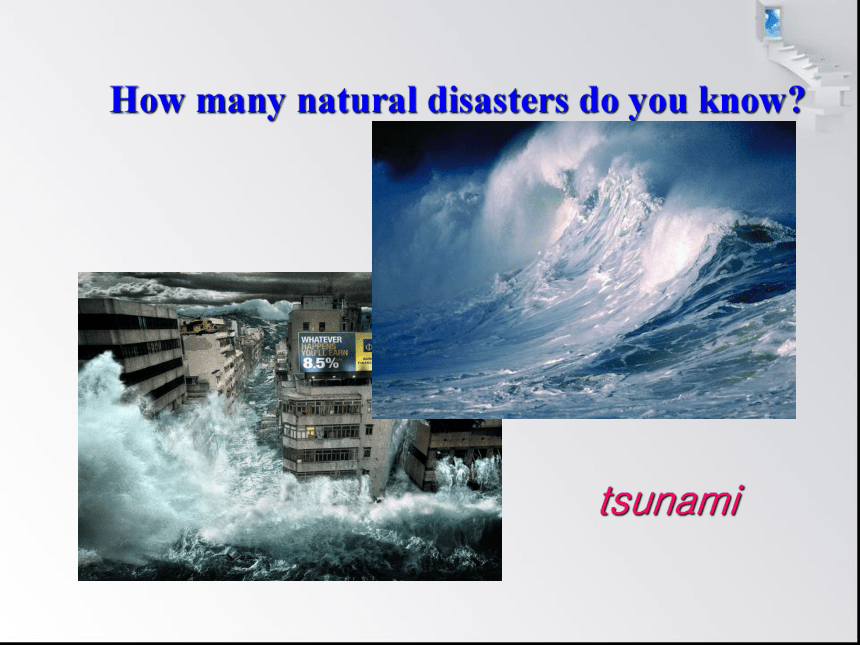
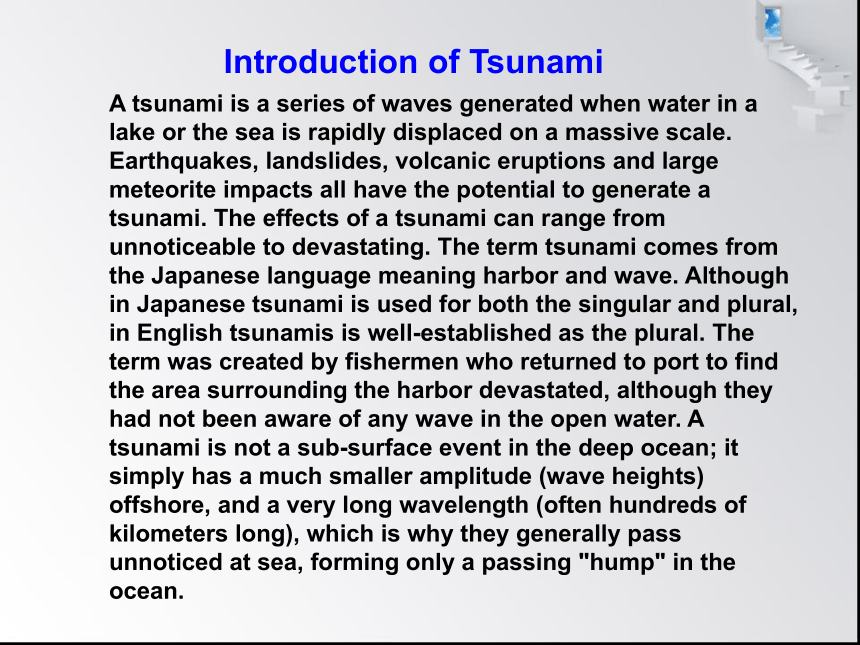
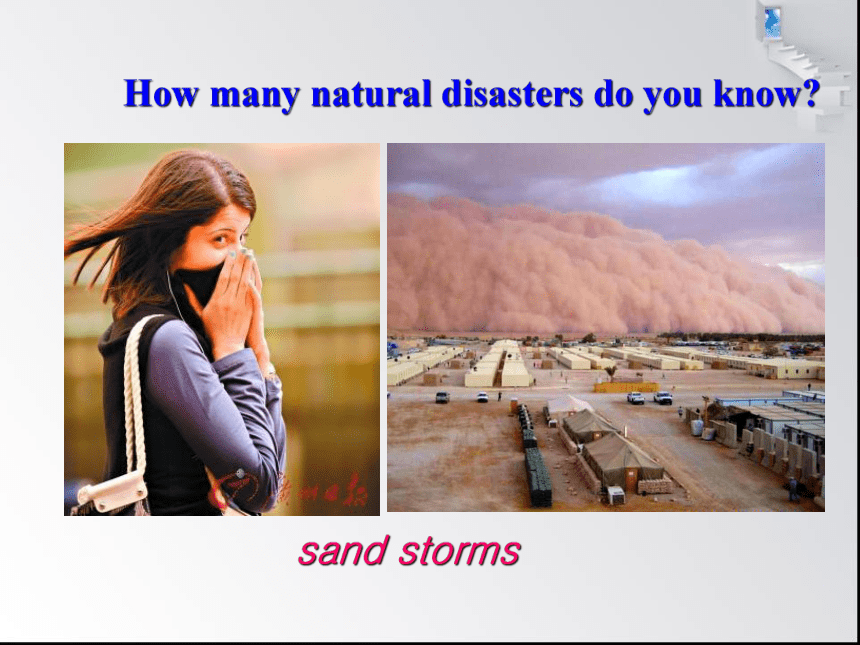
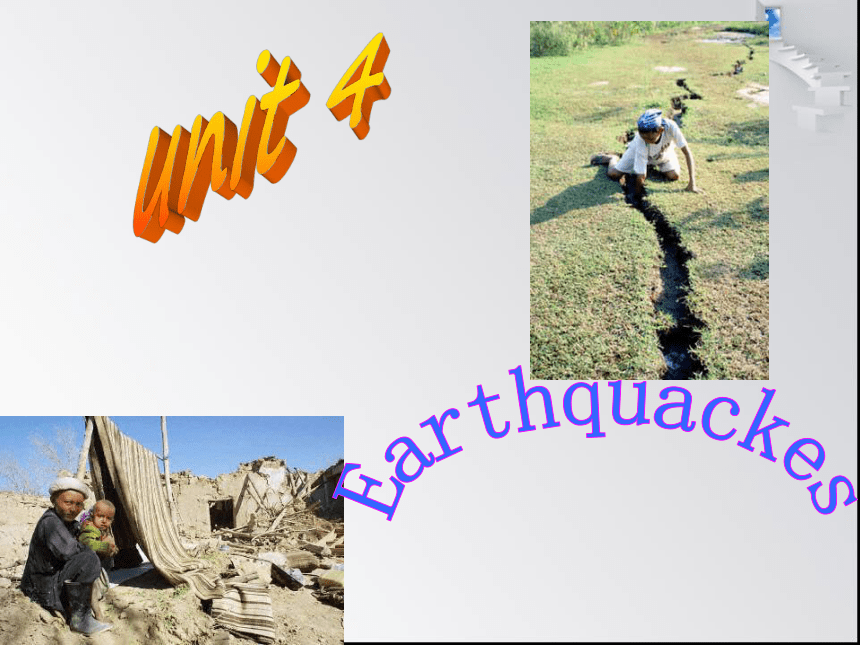
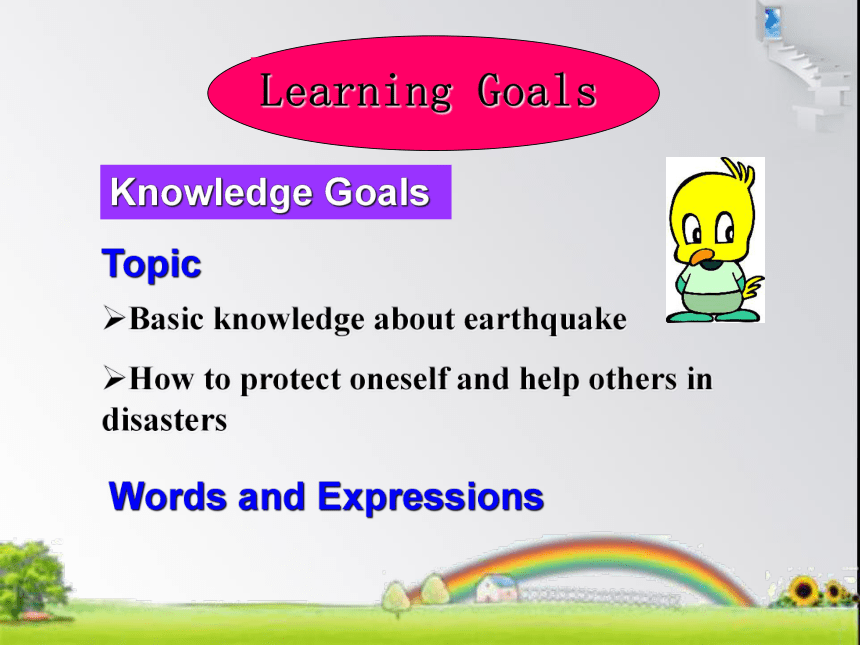
文档简介
(共88张PPT)
How many natural disasters do you know?
typhoon
Lead-in
Pacific typhoon refers to tropical cyclones forming in the northwestern Pacific Ocean. Other tropical cyclones include hurricanes that form over the Atlantic Ocean, Caribbean Sea, the Gulf of Mexico, or the Pacific Ocean north of the equator and east of the Date Line. The basin is demarcated within the Pacific Ocean from Asia, north of the equator, and west of the international date line. Storms from the Eastern and Central Pacific crossing the date line are re-designated as typhoons.
Typhoon paths follow three general directions: -Straight: A general westward path affects the Philippines, southern China, and Vietnam. -Recurving: Storms recurving affect eastern China, Korea, and Japan. -Northward: From point of origin, the storm follows a northerly direction, only affecting small islands.
Introduction of Typhoon
How many natural disasters do you know?
thunderstorm
How many natural disasters do you know?
flood
Flood happens when an area of land, usually low-lying, is covered with water. The worst floods usually occur when a river overflows its banks. Floods happen when soil and vegetation cannot absorb all the water ; water then runs off the land in quantities that cannot be carried in stream channels or kept in natural ponds or man-made reservoirs. Periodic floods occur naturally on many rivers, forming an area known as the flood plain. These river floods usually result from heavy rain, sometimes combined with melting snow, which causes the rivers to overflow their banks. Coastal areas are occasionally flooded by high tides caused by severe winds on ocean surfaces, or by tidal waves caused by undersea earthquakes. There are often many causes for a flood.
Introduction of Flood
How many natural disasters do you know?
volcano
How many natural disasters do you know?
fire
How many natural disasters do you know?
tsunami
A tsunami is a series of waves generated when water in a lake or the sea is rapidly displaced on a massive scale. Earthquakes, landslides, volcanic eruptions and large meteorite impacts all have the potential to generate a tsunami. The effects of a tsunami can range from unnoticeable to devastating. The term tsunami comes from the Japanese language meaning harbor and wave. Although in Japanese tsunami is used for both the singular and plural, in English tsunamis is well-established as the plural. The term was created by fishermen who returned to port to find the area surrounding the harbor devastated, although they had not been aware of any wave in the open water. A tsunami is not a sub-surface event in the deep ocean; it simply has a much smaller amplitude (wave heights) offshore, and a very long wavelength (often hundreds of kilometers long), which is why they generally pass unnoticed at sea, forming only a passing "hump" in the ocean.
Introduction of Tsunami
How many natural disasters do you know?
sand storms
unit 4
Earthquackes
Basic knowledge about earthquake
How to protect oneself and help others in disasters
Knowledge Goals
Topic
Words and Expressions
Learning Goals
imagine shake rise earthquake well pipe nation canal stream dirt ruin suffering extreme injure destroy brick dam frighten freighting congratulation judge express cyclist Useless shock rescue
Words:
1. have time to do 有时间做某事
2. happen to do 碰巧做某事
3. shake hands with sb 握手
4. burst into tears/ laughter 突然哭/笑起来
5. in ruins 成为废墟 6. cut across 穿过、横穿
7. blow away 吹走、刮走 8. fall down 倒塌
9. rescue workers 救援人员
10. be pleased to do 乐意做某事
11. judging….from 根据……来判断
Expressions:
Talking about past experiences
Expressing thanks
Functional Items
Grammar
Learn to use attributive clause:
(以that, which, who 和whose 为引导)
Enable to write a small article to describe an event.
Develop the ability to get the message from different ways, just like the video. Then try your best to use the message in your article.
Have a scientific attitude towards disaster, and grasp more knowledge about how to deal with it.
Ability Goals
Emotion Goals
The disaster and how to deal with it.
The usage of attributive clause
Try to improve the ability of talking about
past experiences by describing the big event
during a disaster.
Important and Difficult Points
Important Points
Try to know the ways to rescue in a
disaster.
2. Try to develop the ability of speaking.
Difficult Points
Compare the two pictures, then have a discussion about the earthquake's harm to the people with your partner.
Today’s Tang Shan
After the earthquake
Warming Up
Today’ s Tang Shan
After the earthquake
Today’ s Tang Shan
After the earthquake
Today’ s Tang Shan
After the earthquake
Compare the two pictures, then have a discussion about the earthquake's harm to the people with your partner.
California
Major earthquake of the world
Earthquakes have occurred on earth's surface since times immemorial. Thousands and thousands of earthquakes happen every year however, most of which go unnoticed as they are either to weak on the Richter scale or happen in remotest of the areas. Earthquakes cause disasters and cause both loss of lives and property.
May 22, 1960 witnessed the world's strongest earthquake in Valdicvia, Chile. The earthquake with a magnitude of 9.5 on Richter scale caused 20,000 fatalities.
The second strongest earthquake occurred on December 26, 2004 with a magnitude of 9.3 on Richter scale. Ocean floor of west Sumatra and Indonesia were the epicenter of this earthquake that caused over 300,000 causalities. This earthquake caused the disastrous tsunami in the Indian Ocean.
On March 27, 1964 Prince William Sound, Alaska faced the world's third strongest earthquake. The earthquake measured 9.2 on Richter scale caused a great deal of damage in Anchorage. Kamchatka, 1952 having 9.0 magnitude and Off the Coast of Ecuador, 1906 having 8.8 magnitude, are the fourth and the fifth strongest earthquakes on the world till date.
Talk about the latest earthquake in last year. As we know, Wenchuan earthquake as huge as Tangshan earthquake in 1976. What did you do when it happened? When you know so many people had died in the earthquake how did you feel? What should we change after the earthquake? Discuss with your classmates.
1. Image your home begins to shake and you must leave it immediately. You have time to take only one thing. What will you take? Why?
2. What do you think will happen before an earthquake?
Pre-reading
1. Fast read the passage, then try to answer the following questions:
(1) When did the earthquake begin?
(2) How many people were killed or injured in the quake?
(3) Who helped to rescue the people?
2. Listen to the text:
Reading
(1) The chickens didn’t eat because they were full.
(2) One third of the people died or were injured during the earthquake.
(3) Such a great number of people died because the quake happened while they were working.
(4) All the hospitals had been destroyed.
(5) Water was needed because dams and wells were useless.
F
F
F
T
T
3. Read for the first time, then do the
following detail questions.
Read for the third time, then try to divide the whole passage for several parts, and the main idea of them.
4. Main idea of each paragraph and timeline
(1) Before the earthquake Paragraph(1)
Strange things began to happen, but no one took any notice of them.
(2) During the earthquake Paragraph (s)(2&3)
It destroyed the city of Tangshan and shocked the people.
(3) After the earthquake Paragraph(4)
Army came to help the survivors, bringing hope for a new life.
From the three days before the earthquake
the strange event.
The water in The village wells ______ and ______;
the well walls had deep ___________;
A _____ gas came out of them.
rose
fell
cracks
smelly
Mice _____________ the fields looking for places to hide.
ran out of
Fish ____________ their bowls and ponds.
jumped out of
At about 3:00 am on July28, 1976
1. Bright lights ________in the sky
appeared
2. The sound of planes could be ______although there were no planes
heard
3. Some water _____burst.
pipes
During the earthquake, at 3:42 am on July 28,1976
1. Everything began to______.
shake
2. Huge cracks _______in the roads.
appeared
3. Stem _____from holes in the ground.
burst
4. Rock ___________rivers of dirt
turned into
5. 75% buildings and 90% of homes were______.
gone
6. More than 400,000 people ______or_______.
killed
injured
After the earthquake (July 28,1976)
1. A second quack almost as _____as the first one .
strong
2. More ______to buildings and rescuers
damage
Soon after the quack.
The army_______.
2. Shelter ______survivors.
3. Water supplies ______in.
arrived
built for
brought
Earthquake Survival Tips
Would you know what to do during a really big earthquake? Experts have looked into matter carefully. It may be worth you while to look over the following tips they have for us.
If the ground begins shaking while you are driving, pull over and stay in your car. If you are in a building, try to get near a strong wall. The corner of the room or the space under a big
Background
doorway is the safest. As soon as the quake is over, check the gas pipe in the building. Gas fires often result from earthquakes.
These tips may prove to be lifesavers. We should, therefore, keep them in mind. Remember to always hope for the best but prepare for the worst.
Background
If it has an earthquake when having classes, the students should listen to the teacher’s instruction, protect their heads and hide under the desks.
If it has an earthquake when the students are in the sports ground, they can crouch on the spot and protect their heads with hands. Be sure to keep away with high building and dangerous objects.
Don’t go back to the classroom.
Retreat in order after the earthquake.
Background
Escape in Public Places
Listen to the command of the site workers. Don’t be scared and don’t rush towards the exits. Try to avoid crowds. Avoid to be squeezed to the wall or barriers.
At theaters and gyms: crouch down or slip under the chairs; avoid suspending lights and electric
Background
fans; protect the head with schoolbags; after the earthquake, listen to the command of the workers, retreat in an organized way.
In department stores, bookstores, museums or subway: find firm counters, commodities (low furniture etc.) or a pillar or the corner of a wall to crouch down on the spot, protect the heads with hands or other objects;
keep away from glass windows, glass counters or show counters; keep away from tall cupboards;
keep away from advertisement boards and other suspending objects.
Background
explanations
Destroy Ruin Damage 的区别
Damage :n.损害, 伤害 v.招致损害n.[律] (用复数)赔偿金
Destroy :vt.破坏, 毁坏, 消灭 v.消灭, 摧毁
destroy程度比damage重很多
Ruin: n. (pl.)废墟,毁灭 v. 毁坏,破坏
vi. (使)破产,毁灭 vt. 毁坏,毁灭
1. Damage, destroy, ruin主要用于无生命的事物, 而hurt, injure, spoil主要用于有生命的人或动物.
2. Damage 通常表示事物的价值或功能部分受损,
如: the ship was damaged in the bottom.
那条船的底部被损坏.
3. Destroy, ruin均表示事物全部被毁,如: destroy all of the three enemy warships 把3艘敌舰全部歼灭;
explanations
1. It seemed as if the world was at an end.
(1) as if 似乎,好像 = as though
She spoke to me as if she knew me.
她和我说话的神情,好像她早就认识我
似的。
(2) as if 在表语从句中相当于that:
It seemed as if the meeting would never end.
会议看起来似乎没完没了。
Language points
本文中as if 的用法就是第二种。
It seemed as if the world was at an end!
= It seemed that the world was at an end!
= The world seemed to be at an end!
It seems that sb…= sb seems to be/do…看来; 好像
Language points
分数的表示法
分子
分母
基数词
序数词
分子大于一,分母用复数
三分之一 one- third
五分之三 three- fifths
2. One –third of the nation felt it.
Language points
Two thirds of the land is covered by forest.
One fifth of the students in this class are girls.
三分之二的地面为森林所覆盖。
这个班里五分之一的学生是女生。
Language points
3. The army organized teams to dig out those who were trapped and to bury the dead.
(1) organize sb. to do sth.组织某人做某事
E.g. The teacher organized the students to have a discussion just now.
Language points
The dog buried the bone in the ground.
I buried myself in my studies.
bury oneself in= be buried in 埋头于…;专心于…
(2) dig out 挖掘;发现
(3) bury : A. to place in the ground 埋藏
B. to occupy (oneself) with deep
concentration; absorb 专注于…
Language points
Words :
Learning about Language
1. quake
vi. 颤抖, (因害怕或寒冷而)发抖
She quaked with fright.
她吓得发抖。
(地面)震动
Our house is quaking.
我们的房屋在震动。
2. well
adv. 好, 对, 满意地; 友好地, 和蔼地; 彻底地, 完全地
Do you eat well at school?
你在学校吃得好吗?
夸奖地, 称赞地
They speak well of him at school.
学校里的人都称赞他。
有理由地, 恰当地
You did well to tell him.
你告诉了他, 做得对。
adj. 健康的; 痊愈的
I don't think he is really a well man.
我认为他并不是真正健康的人。
良好的; 正常的; 令人满意的
All is not well in this country.
这个国家的情况不能令人满意。
interj. (用于表示惊讶, 疑虑, 接受等)
Well! Look at that amazing sight!
哦!看那迷人的景色!
n. 井, 水井
They dug another well in the village.
他们在村里又挖了一口井。
3. pipe
n. 管子, 管道
Water is brought into our houses through pipes.
水通过水管送到我们的屋子里。
烟斗
My pipe has gone out.
我烟斗的火熄灭了。
管乐器, 笛子
He is playing a tune on his pipe.
他在用笛子吹奏一支曲子。
vt. 以管输送
They piped oil yesterday.
昨天他们用管道输送油。
传送
Nearly all the shops have piped music.
差不多所有的商店都连续播放有线广播的音乐。
吹哨子下令(表示欢迎)
The admiral was piped aboard.
海军上将在欢迎他的哨子声中登舰。
滚边, 镶花边
He piped “Happy Birthday” on the cake.
他在蛋糕上镶上了“生日快乐”的字样。
4. stream
n. 小河, 溪流
Can you jump across the stream?
你能跳过这条小溪吗?
流, 一股, 一串
A stream of people was going into the cinema.
一股人流走进影院。
水流方向, 潮流
He hasn't the courage to go against the stream of public opinion.
他没有勇气逆舆论潮流行事。
(按能力分的)班级
She is in the A stream in her middle school.
她中学时在A班。
vt. & vi. 流; 流动
Blood streamed from the wound of the soldier’s.
血从士兵的伤口流出来。
Her eyes were streaming tears because of the movie.
她两眼正流着泪水。
vi. 飘扬; 招展
The flag of our country was streaming in the wind.
我们国家的旗帜在风中飘动。
5. burst
vt. & vi. 爆炸, 爆裂
If you get much fatter you’ll burst your clothes.
你要是再长胖就要把衣服撑破了。
挤满, 充满
The town is bursting with tourists that summer.
今年夏天镇上到处都是游客。
突然打开
We had to burst the door open to rescue her.
我们不得不破门而入来营救她。
突然发作, 突然发生
The storm burst and we all got wet.
暴风雨突然袭来, 我们都淋湿了。
n. 爆炸, 爆裂; 爆发, 突发
His appearance on the platform was greeted with a burst of applause.
他一登上台就博得了一阵热烈的掌声。
Morphology
rain
wind
cloud
snow
sun
health
rainy
windy
cloudy
snowy
sunny
healthy
名词
形容词
wealth
wind
windy
wealthy
名词
形容词
Expressions :
1. right away 立刻,马上
Tell him that I’m coming right away.?
告诉他我就这来。
Are you leaving right away without visiting her??
你不拜访她,马上就走吗?
2. as if 好像,似乎
She sang as if inspired.?
她好像灵感受到引发而唱起歌来。
Why doesn’t she buy me a drink? It isn’t as if she had no money!
她为什么不给我买一点饮料?好像她没钱似的!
3. at an end 结束,终止
They wished the voyage at an end.?
他们渴望航行结束。
Everything between them was at an end.?
他们间一切都结束了。
4. in ruins 严重受损, 破败不堪
The city lay in ruins after the earthquake.
地震之后, 这座城市成为一片废墟。
The country was laid in ruins.?
这个国家处于毁灭状态。
5. dig out
挖掘; 挖走
The workmen dug out a deep channel for the water.
工人们挖出一条深水沟。
The injured men have been dug out of the snow.
受伤人员从雪中被挖了出来。
找出来, 发掘
Why did you dig out all these old magazines?
你把这些旧杂志翻出来做什么?
Quite a number of valuable details were dug out of libraries and archives by the group of researchers.
这组研究人员从图书和档案资料中查找出一批相当有价值的详细资料。
匆匆地离开
She didn't say where to go, just dug out.
她没有讲要到哪儿去, 只是匆匆地走了。
6. a number of 许多的
A number of new products have been successfully trial-produced.
许多新产品已试制成功。
A great number of problems have arisen.
出现了许多问题。
Brainstorming
earthquake
feeling
damage
events
Rescue work
From the earthquake what would you think, find the word you learned from this unit. You can describe it from four aspects.
定语从句的概念
——定语从句
Structures
在复合句中,修饰某一名词或代词,用做定语的从句叫定语从句。被定语从句所修饰的词叫先行词;定语从句必须放在先行词之后;
引导定语从句的关系代词有who, whom, that, which, whose和关系副词when, where, why.
Usages
主语 宾语 定语
人 who
that (whom)
(that) whose
物 which
that (which)
(that) whose
找出先行词以及关系词引导的句子
The foreigner who visited our class yesterday is from Canada.
A new master who will teach you German will come tomorrow.
把它们分成两个句子
The foreigner is from Canada.
The foreigner visited our class yesterday.
A new master will come tomorrow.
A new master will teach you German.
( )
( )
关系代词which, who, whom, that, whose,与关系副词where, when, why的区别: 关系代词直接代替先行词,关系副词代替介词短语.
The factory ______ I visit is big.
The factory is big.
I visit the factory.
The factory ______ I work is big.
The factory is big.
I work the factory.
___________
( )
____________
( )
in
in the factory是介词短语,表地点,所以用where或者in which代替.
which
where
in which
This is the reason _____ he told me last night.
This is the reason.
He told me the reason last night.
This is the reason _____ he was late.
This is the reason.
He was late the reason.
___________
( )
which
__________
( )
why
for
why =for which
定语从句概念归纳
1.定语从句中的主谓一致
关系代词作定语从句的主语时,从句谓语动词的人称和数要与先行词一致;先行词代表一个句子作主语时,从句谓语用第三人称单数形式.
The building which ________ (stand) near the river is our school.
stands
(1) 当先行词是anything, something, nothing, all, few, little, none, all 等不定代词或被all, any, every, each, no, some等修饰时。
(2) 先行词被the only, the very, the last修饰时。
(3) 先行词被序数词或形容词最高级修饰时。
(4) 先行词既有人又有物时。
He is the only person ______ treats me as a friend here.
that
2.下列情况用that 不用which
4. 分隔定语从句
有时为了句子的平衡,定语从句与先行词常被插入其他成分。
The day will come ______ we shall celebrate Women’s Day.
when
3. 下列情况用which 不用that
(1) 引导非限定性定语从句时。(有逗号隔开)
(2) 在 “介词+which/whom” 结构中。
This is the market at ______ I bought the baby carriage last Sunday.
which
5. (the) one of 结构:
one of +n.(pl.) 后跟定语从句时, 从句中的谓语动词用复数,但当有the only修饰one of +pl.时,其后跟的定语从句中的谓语动词用单数。
He is the only one of the students who ______ (have) been a winner of scholarship for three years.
has
1. The fan which you want is on the desk.
2. The man who brought our textbooks here yesterday is in the next room.
3. The letter which I received yesterday is from my sister.
4. The play which we saw last night was wonderful.
一、分解句子
Exercises
1. The fan is on the desk.
You want the fan.
2. The man is in the next room
The man brought a textbook here yesterday.
3. The letter is from my sister.
The letter was received by me yesterday.
4. The play was wonderful.
We saw the play last night.
Answers
1.The man ________is talking to me is a friend of my father’s.
2.The school __________is famous here has a long history.
3.I live in the house ______windows face south.
4.He is the boy __________ we are waiting for.
that/who
that/which
whose
who/whom
二、用合适的关系代词填空
Exercises
Proverbs
He who laughs last laughs best.
谁笑到最后谁笑得最好。
All is well that end well.
结局好,一切都好。
Friendship is like health, the value of which is seldom know until it is lost.
真正的友谊犹如健康的身体,失去时方知其可贵。
1. invitation n. 邀请
invite v.
a letter of invitation 一封邀请信
2. give a speech 作报告/演讲
3. Office of the City Government市政府办公室
4. be/feel proud of 对…感到自豪
= feel/find/take pride in
5. open a new park 开放新的公园
Some words and expressions
Using Language
6. in honor of 向…表示敬意; 为了纪念…
7. as you know 如你所知
8. on that special day 在那个特殊的日子
9. write an article for… 为…写文章
10. write an outline 写提纲
11. disaster-hit areas 受灾区
Some words and expressions
When did the earthquake begin?
What did the speaker do after he woke up?
What did he see and hear outside?
What happened to the man next to him?
How did he get away from the city?
Which of your adjectives describe the man’s feelings most closely?
Goups Discuss
Suggested Answers:
1. The earthquake began around 5 o’clock in the
morning.
2. The speaker rushed outside as soon as he woke
up.
3. When he got outside he thought the world had
come to an end. He heard people running
everywhere and bricks falling down from
buildings. There were big fires too.
4. The man next to him was killed by bricks.
falling from a nearby building.
5. He got away from the city by boat.
6. Very shocked, devastated.
Writing
Image you are a girl from Sichuan province, and your home town has been destroyed. But after the army arrived, your hometown has been reconstructed.
You want to write a letter to express you thanks to the army. (in the letter, please describe the situation your home town now.)
重点单词
earthquake 地震 steam 蒸汽 quake地震
dirt污垢 right away 立刻马上 ruin 废墟
well 井 in ruins 破败不堪 pipe 管
suffering 苦难 burst 爆发 extreme极度的
injure损害伤害 event事件 destroy毁坏
as if 好象 brick砖 at an end 结束
dam水坝 nation民族国家 track轨道足迹
canal 运河 useless 无用的-useful use v. n.
Summing-up
重点短语
have time to do 有时间做某事
happen to do 碰巧做某事
shake hands with sb 握手???????
burst into tears/ laughter?
in ruins 成为废墟????
cut across 穿过、横穿
blow away 吹走、刮走??
fall down 倒塌
rescue workers 救援人员????
be pleased to do 乐意做某事
make/ give a speech 发表说????
judging….from 根据……来判断
话题:
earthquake and the earthquake
Survival skill
功能:
感谢 (Thanks)
语法:
定语从句(attributive clause)
1. The number of people invited ____ fifty, but a number of them _____ absent for different reasons.
A. were ; was B. was ; was
C. was ; were D. were ; were
2. We wanted to say something; she, ____, waited for no explanation.
A. but B. however C. yet D. and yet
C
B
一、单项选择
Exercises
二、用 “rise” 或 “raise”填空
The people’s living standard has greatly
been ________.
They can _______ rice here.
Her job is _________ chickens.
Let’s _______ glasses to our friendship.
He’s _______ in rank.
The book has_______ in value.
Her temperature is still _______.
raised
raise
raising
risen
raise
risen
rising
三、介、副词填空
1. They are planning to tear _______ these old houses ________new buildings.
2. He' s new in the office but he' 11 soon shake ________.
3. I'll get in touch _________them right
_________.
4. Leaders hope that serious differences on the issue among their fellows are now ________an end.
5. The houses across the street a _____ ruins.
down
for
down
with
away
at
in
四、翻译下列句子
1. 这就是救了孩子生命的医生。
2. 正在弹钢琴的那位女士是张小姐。
3. 我知道她学习好的原因。
4. 约翰正是她想见的人。
This is the doctor who saved the child.
The lady who is playing piano is Miss Zhang.
I know the reason why she studies well.
John is the man who she wants to see.
bye bye
How many natural disasters do you know?
typhoon
Lead-in
Pacific typhoon refers to tropical cyclones forming in the northwestern Pacific Ocean. Other tropical cyclones include hurricanes that form over the Atlantic Ocean, Caribbean Sea, the Gulf of Mexico, or the Pacific Ocean north of the equator and east of the Date Line. The basin is demarcated within the Pacific Ocean from Asia, north of the equator, and west of the international date line. Storms from the Eastern and Central Pacific crossing the date line are re-designated as typhoons.
Typhoon paths follow three general directions: -Straight: A general westward path affects the Philippines, southern China, and Vietnam. -Recurving: Storms recurving affect eastern China, Korea, and Japan. -Northward: From point of origin, the storm follows a northerly direction, only affecting small islands.
Introduction of Typhoon
How many natural disasters do you know?
thunderstorm
How many natural disasters do you know?
flood
Flood happens when an area of land, usually low-lying, is covered with water. The worst floods usually occur when a river overflows its banks. Floods happen when soil and vegetation cannot absorb all the water ; water then runs off the land in quantities that cannot be carried in stream channels or kept in natural ponds or man-made reservoirs. Periodic floods occur naturally on many rivers, forming an area known as the flood plain. These river floods usually result from heavy rain, sometimes combined with melting snow, which causes the rivers to overflow their banks. Coastal areas are occasionally flooded by high tides caused by severe winds on ocean surfaces, or by tidal waves caused by undersea earthquakes. There are often many causes for a flood.
Introduction of Flood
How many natural disasters do you know?
volcano
How many natural disasters do you know?
fire
How many natural disasters do you know?
tsunami
A tsunami is a series of waves generated when water in a lake or the sea is rapidly displaced on a massive scale. Earthquakes, landslides, volcanic eruptions and large meteorite impacts all have the potential to generate a tsunami. The effects of a tsunami can range from unnoticeable to devastating. The term tsunami comes from the Japanese language meaning harbor and wave. Although in Japanese tsunami is used for both the singular and plural, in English tsunamis is well-established as the plural. The term was created by fishermen who returned to port to find the area surrounding the harbor devastated, although they had not been aware of any wave in the open water. A tsunami is not a sub-surface event in the deep ocean; it simply has a much smaller amplitude (wave heights) offshore, and a very long wavelength (often hundreds of kilometers long), which is why they generally pass unnoticed at sea, forming only a passing "hump" in the ocean.
Introduction of Tsunami
How many natural disasters do you know?
sand storms
unit 4
Earthquackes
Basic knowledge about earthquake
How to protect oneself and help others in disasters
Knowledge Goals
Topic
Words and Expressions
Learning Goals
imagine shake rise earthquake well pipe nation canal stream dirt ruin suffering extreme injure destroy brick dam frighten freighting congratulation judge express cyclist Useless shock rescue
Words:
1. have time to do 有时间做某事
2. happen to do 碰巧做某事
3. shake hands with sb 握手
4. burst into tears/ laughter 突然哭/笑起来
5. in ruins 成为废墟 6. cut across 穿过、横穿
7. blow away 吹走、刮走 8. fall down 倒塌
9. rescue workers 救援人员
10. be pleased to do 乐意做某事
11. judging….from 根据……来判断
Expressions:
Talking about past experiences
Expressing thanks
Functional Items
Grammar
Learn to use attributive clause:
(以that, which, who 和whose 为引导)
Enable to write a small article to describe an event.
Develop the ability to get the message from different ways, just like the video. Then try your best to use the message in your article.
Have a scientific attitude towards disaster, and grasp more knowledge about how to deal with it.
Ability Goals
Emotion Goals
The disaster and how to deal with it.
The usage of attributive clause
Try to improve the ability of talking about
past experiences by describing the big event
during a disaster.
Important and Difficult Points
Important Points
Try to know the ways to rescue in a
disaster.
2. Try to develop the ability of speaking.
Difficult Points
Compare the two pictures, then have a discussion about the earthquake's harm to the people with your partner.
Today’s Tang Shan
After the earthquake
Warming Up
Today’ s Tang Shan
After the earthquake
Today’ s Tang Shan
After the earthquake
Today’ s Tang Shan
After the earthquake
Compare the two pictures, then have a discussion about the earthquake's harm to the people with your partner.
California
Major earthquake of the world
Earthquakes have occurred on earth's surface since times immemorial. Thousands and thousands of earthquakes happen every year however, most of which go unnoticed as they are either to weak on the Richter scale or happen in remotest of the areas. Earthquakes cause disasters and cause both loss of lives and property.
May 22, 1960 witnessed the world's strongest earthquake in Valdicvia, Chile. The earthquake with a magnitude of 9.5 on Richter scale caused 20,000 fatalities.
The second strongest earthquake occurred on December 26, 2004 with a magnitude of 9.3 on Richter scale. Ocean floor of west Sumatra and Indonesia were the epicenter of this earthquake that caused over 300,000 causalities. This earthquake caused the disastrous tsunami in the Indian Ocean.
On March 27, 1964 Prince William Sound, Alaska faced the world's third strongest earthquake. The earthquake measured 9.2 on Richter scale caused a great deal of damage in Anchorage. Kamchatka, 1952 having 9.0 magnitude and Off the Coast of Ecuador, 1906 having 8.8 magnitude, are the fourth and the fifth strongest earthquakes on the world till date.
Talk about the latest earthquake in last year. As we know, Wenchuan earthquake as huge as Tangshan earthquake in 1976. What did you do when it happened? When you know so many people had died in the earthquake how did you feel? What should we change after the earthquake? Discuss with your classmates.
1. Image your home begins to shake and you must leave it immediately. You have time to take only one thing. What will you take? Why?
2. What do you think will happen before an earthquake?
Pre-reading
1. Fast read the passage, then try to answer the following questions:
(1) When did the earthquake begin?
(2) How many people were killed or injured in the quake?
(3) Who helped to rescue the people?
2. Listen to the text:
Reading
(1) The chickens didn’t eat because they were full.
(2) One third of the people died or were injured during the earthquake.
(3) Such a great number of people died because the quake happened while they were working.
(4) All the hospitals had been destroyed.
(5) Water was needed because dams and wells were useless.
F
F
F
T
T
3. Read for the first time, then do the
following detail questions.
Read for the third time, then try to divide the whole passage for several parts, and the main idea of them.
4. Main idea of each paragraph and timeline
(1) Before the earthquake Paragraph(1)
Strange things began to happen, but no one took any notice of them.
(2) During the earthquake Paragraph (s)(2&3)
It destroyed the city of Tangshan and shocked the people.
(3) After the earthquake Paragraph(4)
Army came to help the survivors, bringing hope for a new life.
From the three days before the earthquake
the strange event.
The water in The village wells ______ and ______;
the well walls had deep ___________;
A _____ gas came out of them.
rose
fell
cracks
smelly
Mice _____________ the fields looking for places to hide.
ran out of
Fish ____________ their bowls and ponds.
jumped out of
At about 3:00 am on July28, 1976
1. Bright lights ________in the sky
appeared
2. The sound of planes could be ______although there were no planes
heard
3. Some water _____burst.
pipes
During the earthquake, at 3:42 am on July 28,1976
1. Everything began to______.
shake
2. Huge cracks _______in the roads.
appeared
3. Stem _____from holes in the ground.
burst
4. Rock ___________rivers of dirt
turned into
5. 75% buildings and 90% of homes were______.
gone
6. More than 400,000 people ______or_______.
killed
injured
After the earthquake (July 28,1976)
1. A second quack almost as _____as the first one .
strong
2. More ______to buildings and rescuers
damage
Soon after the quack.
The army_______.
2. Shelter ______survivors.
3. Water supplies ______in.
arrived
built for
brought
Earthquake Survival Tips
Would you know what to do during a really big earthquake? Experts have looked into matter carefully. It may be worth you while to look over the following tips they have for us.
If the ground begins shaking while you are driving, pull over and stay in your car. If you are in a building, try to get near a strong wall. The corner of the room or the space under a big
Background
doorway is the safest. As soon as the quake is over, check the gas pipe in the building. Gas fires often result from earthquakes.
These tips may prove to be lifesavers. We should, therefore, keep them in mind. Remember to always hope for the best but prepare for the worst.
Background
If it has an earthquake when having classes, the students should listen to the teacher’s instruction, protect their heads and hide under the desks.
If it has an earthquake when the students are in the sports ground, they can crouch on the spot and protect their heads with hands. Be sure to keep away with high building and dangerous objects.
Don’t go back to the classroom.
Retreat in order after the earthquake.
Background
Escape in Public Places
Listen to the command of the site workers. Don’t be scared and don’t rush towards the exits. Try to avoid crowds. Avoid to be squeezed to the wall or barriers.
At theaters and gyms: crouch down or slip under the chairs; avoid suspending lights and electric
Background
fans; protect the head with schoolbags; after the earthquake, listen to the command of the workers, retreat in an organized way.
In department stores, bookstores, museums or subway: find firm counters, commodities (low furniture etc.) or a pillar or the corner of a wall to crouch down on the spot, protect the heads with hands or other objects;
keep away from glass windows, glass counters or show counters; keep away from tall cupboards;
keep away from advertisement boards and other suspending objects.
Background
explanations
Destroy Ruin Damage 的区别
Damage :n.损害, 伤害 v.招致损害n.[律] (用复数)赔偿金
Destroy :vt.破坏, 毁坏, 消灭 v.消灭, 摧毁
destroy程度比damage重很多
Ruin: n. (pl.)废墟,毁灭 v. 毁坏,破坏
vi. (使)破产,毁灭 vt. 毁坏,毁灭
1. Damage, destroy, ruin主要用于无生命的事物, 而hurt, injure, spoil主要用于有生命的人或动物.
2. Damage 通常表示事物的价值或功能部分受损,
如: the ship was damaged in the bottom.
那条船的底部被损坏.
3. Destroy, ruin均表示事物全部被毁,如: destroy all of the three enemy warships 把3艘敌舰全部歼灭;
explanations
1. It seemed as if the world was at an end.
(1) as if 似乎,好像 = as though
She spoke to me as if she knew me.
她和我说话的神情,好像她早就认识我
似的。
(2) as if 在表语从句中相当于that:
It seemed as if the meeting would never end.
会议看起来似乎没完没了。
Language points
本文中as if 的用法就是第二种。
It seemed as if the world was at an end!
= It seemed that the world was at an end!
= The world seemed to be at an end!
It seems that sb…= sb seems to be/do…看来; 好像
Language points
分数的表示法
分子
分母
基数词
序数词
分子大于一,分母用复数
三分之一 one- third
五分之三 three- fifths
2. One –third of the nation felt it.
Language points
Two thirds of the land is covered by forest.
One fifth of the students in this class are girls.
三分之二的地面为森林所覆盖。
这个班里五分之一的学生是女生。
Language points
3. The army organized teams to dig out those who were trapped and to bury the dead.
(1) organize sb. to do sth.组织某人做某事
E.g. The teacher organized the students to have a discussion just now.
Language points
The dog buried the bone in the ground.
I buried myself in my studies.
bury oneself in= be buried in 埋头于…;专心于…
(2) dig out 挖掘;发现
(3) bury : A. to place in the ground 埋藏
B. to occupy (oneself) with deep
concentration; absorb 专注于…
Language points
Words :
Learning about Language
1. quake
vi. 颤抖, (因害怕或寒冷而)发抖
She quaked with fright.
她吓得发抖。
(地面)震动
Our house is quaking.
我们的房屋在震动。
2. well
adv. 好, 对, 满意地; 友好地, 和蔼地; 彻底地, 完全地
Do you eat well at school?
你在学校吃得好吗?
夸奖地, 称赞地
They speak well of him at school.
学校里的人都称赞他。
有理由地, 恰当地
You did well to tell him.
你告诉了他, 做得对。
adj. 健康的; 痊愈的
I don't think he is really a well man.
我认为他并不是真正健康的人。
良好的; 正常的; 令人满意的
All is not well in this country.
这个国家的情况不能令人满意。
interj. (用于表示惊讶, 疑虑, 接受等)
Well! Look at that amazing sight!
哦!看那迷人的景色!
n. 井, 水井
They dug another well in the village.
他们在村里又挖了一口井。
3. pipe
n. 管子, 管道
Water is brought into our houses through pipes.
水通过水管送到我们的屋子里。
烟斗
My pipe has gone out.
我烟斗的火熄灭了。
管乐器, 笛子
He is playing a tune on his pipe.
他在用笛子吹奏一支曲子。
vt. 以管输送
They piped oil yesterday.
昨天他们用管道输送油。
传送
Nearly all the shops have piped music.
差不多所有的商店都连续播放有线广播的音乐。
吹哨子下令(表示欢迎)
The admiral was piped aboard.
海军上将在欢迎他的哨子声中登舰。
滚边, 镶花边
He piped “Happy Birthday” on the cake.
他在蛋糕上镶上了“生日快乐”的字样。
4. stream
n. 小河, 溪流
Can you jump across the stream?
你能跳过这条小溪吗?
流, 一股, 一串
A stream of people was going into the cinema.
一股人流走进影院。
水流方向, 潮流
He hasn't the courage to go against the stream of public opinion.
他没有勇气逆舆论潮流行事。
(按能力分的)班级
She is in the A stream in her middle school.
她中学时在A班。
vt. & vi. 流; 流动
Blood streamed from the wound of the soldier’s.
血从士兵的伤口流出来。
Her eyes were streaming tears because of the movie.
她两眼正流着泪水。
vi. 飘扬; 招展
The flag of our country was streaming in the wind.
我们国家的旗帜在风中飘动。
5. burst
vt. & vi. 爆炸, 爆裂
If you get much fatter you’ll burst your clothes.
你要是再长胖就要把衣服撑破了。
挤满, 充满
The town is bursting with tourists that summer.
今年夏天镇上到处都是游客。
突然打开
We had to burst the door open to rescue her.
我们不得不破门而入来营救她。
突然发作, 突然发生
The storm burst and we all got wet.
暴风雨突然袭来, 我们都淋湿了。
n. 爆炸, 爆裂; 爆发, 突发
His appearance on the platform was greeted with a burst of applause.
他一登上台就博得了一阵热烈的掌声。
Morphology
rain
wind
cloud
snow
sun
health
rainy
windy
cloudy
snowy
sunny
healthy
名词
形容词
wealth
wind
windy
wealthy
名词
形容词
Expressions :
1. right away 立刻,马上
Tell him that I’m coming right away.?
告诉他我就这来。
Are you leaving right away without visiting her??
你不拜访她,马上就走吗?
2. as if 好像,似乎
She sang as if inspired.?
她好像灵感受到引发而唱起歌来。
Why doesn’t she buy me a drink? It isn’t as if she had no money!
她为什么不给我买一点饮料?好像她没钱似的!
3. at an end 结束,终止
They wished the voyage at an end.?
他们渴望航行结束。
Everything between them was at an end.?
他们间一切都结束了。
4. in ruins 严重受损, 破败不堪
The city lay in ruins after the earthquake.
地震之后, 这座城市成为一片废墟。
The country was laid in ruins.?
这个国家处于毁灭状态。
5. dig out
挖掘; 挖走
The workmen dug out a deep channel for the water.
工人们挖出一条深水沟。
The injured men have been dug out of the snow.
受伤人员从雪中被挖了出来。
找出来, 发掘
Why did you dig out all these old magazines?
你把这些旧杂志翻出来做什么?
Quite a number of valuable details were dug out of libraries and archives by the group of researchers.
这组研究人员从图书和档案资料中查找出一批相当有价值的详细资料。
匆匆地离开
She didn't say where to go, just dug out.
她没有讲要到哪儿去, 只是匆匆地走了。
6. a number of 许多的
A number of new products have been successfully trial-produced.
许多新产品已试制成功。
A great number of problems have arisen.
出现了许多问题。
Brainstorming
earthquake
feeling
damage
events
Rescue work
From the earthquake what would you think, find the word you learned from this unit. You can describe it from four aspects.
定语从句的概念
——定语从句
Structures
在复合句中,修饰某一名词或代词,用做定语的从句叫定语从句。被定语从句所修饰的词叫先行词;定语从句必须放在先行词之后;
引导定语从句的关系代词有who, whom, that, which, whose和关系副词when, where, why.
Usages
主语 宾语 定语
人 who
that (whom)
(that) whose
物 which
that (which)
(that) whose
找出先行词以及关系词引导的句子
The foreigner who visited our class yesterday is from Canada.
A new master who will teach you German will come tomorrow.
把它们分成两个句子
The foreigner is from Canada.
The foreigner visited our class yesterday.
A new master will come tomorrow.
A new master will teach you German.
( )
( )
关系代词which, who, whom, that, whose,与关系副词where, when, why的区别: 关系代词直接代替先行词,关系副词代替介词短语.
The factory ______ I visit is big.
The factory is big.
I visit the factory.
The factory ______ I work is big.
The factory is big.
I work the factory.
___________
( )
____________
( )
in
in the factory是介词短语,表地点,所以用where或者in which代替.
which
where
in which
This is the reason _____ he told me last night.
This is the reason.
He told me the reason last night.
This is the reason _____ he was late.
This is the reason.
He was late the reason.
___________
( )
which
__________
( )
why
for
why =for which
定语从句概念归纳
1.定语从句中的主谓一致
关系代词作定语从句的主语时,从句谓语动词的人称和数要与先行词一致;先行词代表一个句子作主语时,从句谓语用第三人称单数形式.
The building which ________ (stand) near the river is our school.
stands
(1) 当先行词是anything, something, nothing, all, few, little, none, all 等不定代词或被all, any, every, each, no, some等修饰时。
(2) 先行词被the only, the very, the last修饰时。
(3) 先行词被序数词或形容词最高级修饰时。
(4) 先行词既有人又有物时。
He is the only person ______ treats me as a friend here.
that
2.下列情况用that 不用which
4. 分隔定语从句
有时为了句子的平衡,定语从句与先行词常被插入其他成分。
The day will come ______ we shall celebrate Women’s Day.
when
3. 下列情况用which 不用that
(1) 引导非限定性定语从句时。(有逗号隔开)
(2) 在 “介词+which/whom” 结构中。
This is the market at ______ I bought the baby carriage last Sunday.
which
5. (the) one of 结构:
one of +n.(pl.) 后跟定语从句时, 从句中的谓语动词用复数,但当有the only修饰one of +pl.时,其后跟的定语从句中的谓语动词用单数。
He is the only one of the students who ______ (have) been a winner of scholarship for three years.
has
1. The fan which you want is on the desk.
2. The man who brought our textbooks here yesterday is in the next room.
3. The letter which I received yesterday is from my sister.
4. The play which we saw last night was wonderful.
一、分解句子
Exercises
1. The fan is on the desk.
You want the fan.
2. The man is in the next room
The man brought a textbook here yesterday.
3. The letter is from my sister.
The letter was received by me yesterday.
4. The play was wonderful.
We saw the play last night.
Answers
1.The man ________is talking to me is a friend of my father’s.
2.The school __________is famous here has a long history.
3.I live in the house ______windows face south.
4.He is the boy __________ we are waiting for.
that/who
that/which
whose
who/whom
二、用合适的关系代词填空
Exercises
Proverbs
He who laughs last laughs best.
谁笑到最后谁笑得最好。
All is well that end well.
结局好,一切都好。
Friendship is like health, the value of which is seldom know until it is lost.
真正的友谊犹如健康的身体,失去时方知其可贵。
1. invitation n. 邀请
invite v.
a letter of invitation 一封邀请信
2. give a speech 作报告/演讲
3. Office of the City Government市政府办公室
4. be/feel proud of 对…感到自豪
= feel/find/take pride in
5. open a new park 开放新的公园
Some words and expressions
Using Language
6. in honor of 向…表示敬意; 为了纪念…
7. as you know 如你所知
8. on that special day 在那个特殊的日子
9. write an article for… 为…写文章
10. write an outline 写提纲
11. disaster-hit areas 受灾区
Some words and expressions
When did the earthquake begin?
What did the speaker do after he woke up?
What did he see and hear outside?
What happened to the man next to him?
How did he get away from the city?
Which of your adjectives describe the man’s feelings most closely?
Goups Discuss
Suggested Answers:
1. The earthquake began around 5 o’clock in the
morning.
2. The speaker rushed outside as soon as he woke
up.
3. When he got outside he thought the world had
come to an end. He heard people running
everywhere and bricks falling down from
buildings. There were big fires too.
4. The man next to him was killed by bricks.
falling from a nearby building.
5. He got away from the city by boat.
6. Very shocked, devastated.
Writing
Image you are a girl from Sichuan province, and your home town has been destroyed. But after the army arrived, your hometown has been reconstructed.
You want to write a letter to express you thanks to the army. (in the letter, please describe the situation your home town now.)
重点单词
earthquake 地震 steam 蒸汽 quake地震
dirt污垢 right away 立刻马上 ruin 废墟
well 井 in ruins 破败不堪 pipe 管
suffering 苦难 burst 爆发 extreme极度的
injure损害伤害 event事件 destroy毁坏
as if 好象 brick砖 at an end 结束
dam水坝 nation民族国家 track轨道足迹
canal 运河 useless 无用的-useful use v. n.
Summing-up
重点短语
have time to do 有时间做某事
happen to do 碰巧做某事
shake hands with sb 握手???????
burst into tears/ laughter?
in ruins 成为废墟????
cut across 穿过、横穿
blow away 吹走、刮走??
fall down 倒塌
rescue workers 救援人员????
be pleased to do 乐意做某事
make/ give a speech 发表说????
judging….from 根据……来判断
话题:
earthquake and the earthquake
Survival skill
功能:
感谢 (Thanks)
语法:
定语从句(attributive clause)
1. The number of people invited ____ fifty, but a number of them _____ absent for different reasons.
A. were ; was B. was ; was
C. was ; were D. were ; were
2. We wanted to say something; she, ____, waited for no explanation.
A. but B. however C. yet D. and yet
C
B
一、单项选择
Exercises
二、用 “rise” 或 “raise”填空
The people’s living standard has greatly
been ________.
They can _______ rice here.
Her job is _________ chickens.
Let’s _______ glasses to our friendship.
He’s _______ in rank.
The book has_______ in value.
Her temperature is still _______.
raised
raise
raising
risen
raise
risen
rising
三、介、副词填空
1. They are planning to tear _______ these old houses ________new buildings.
2. He' s new in the office but he' 11 soon shake ________.
3. I'll get in touch _________them right
_________.
4. Leaders hope that serious differences on the issue among their fellows are now ________an end.
5. The houses across the street a _____ ruins.
down
for
down
with
away
at
in
四、翻译下列句子
1. 这就是救了孩子生命的医生。
2. 正在弹钢琴的那位女士是张小姐。
3. 我知道她学习好的原因。
4. 约翰正是她想见的人。
This is the doctor who saved the child.
The lady who is playing piano is Miss Zhang.
I know the reason why she studies well.
John is the man who she wants to see.
bye bye
